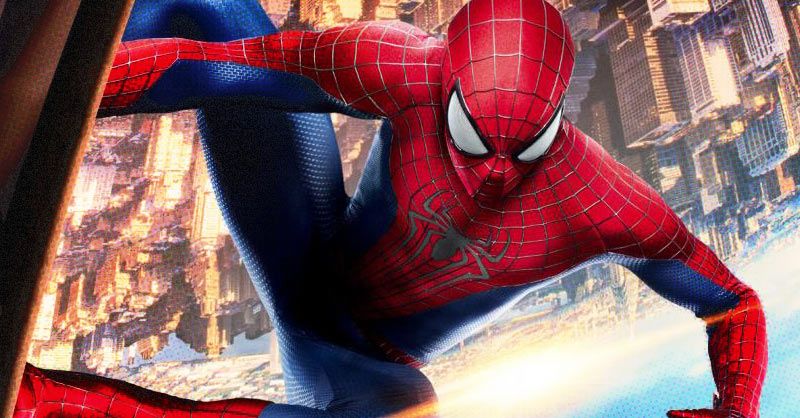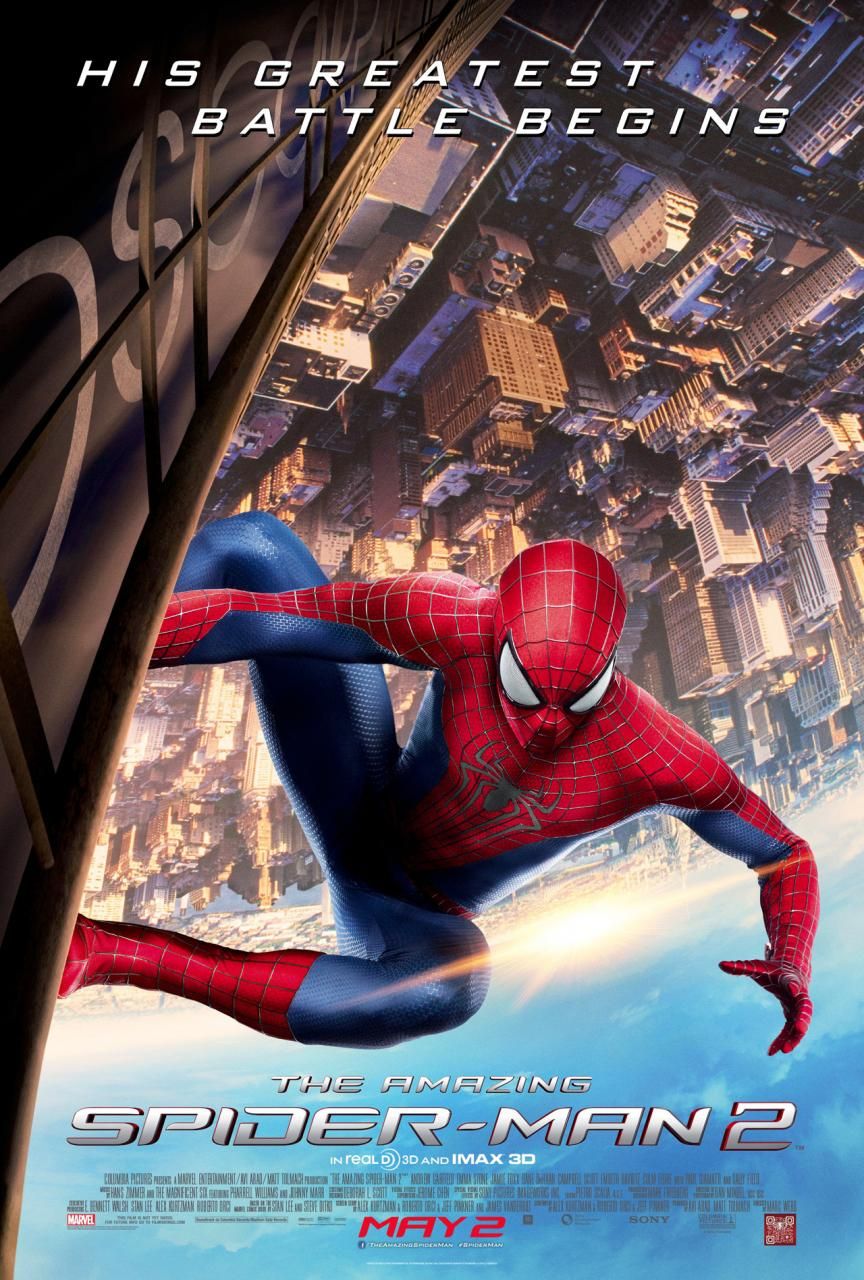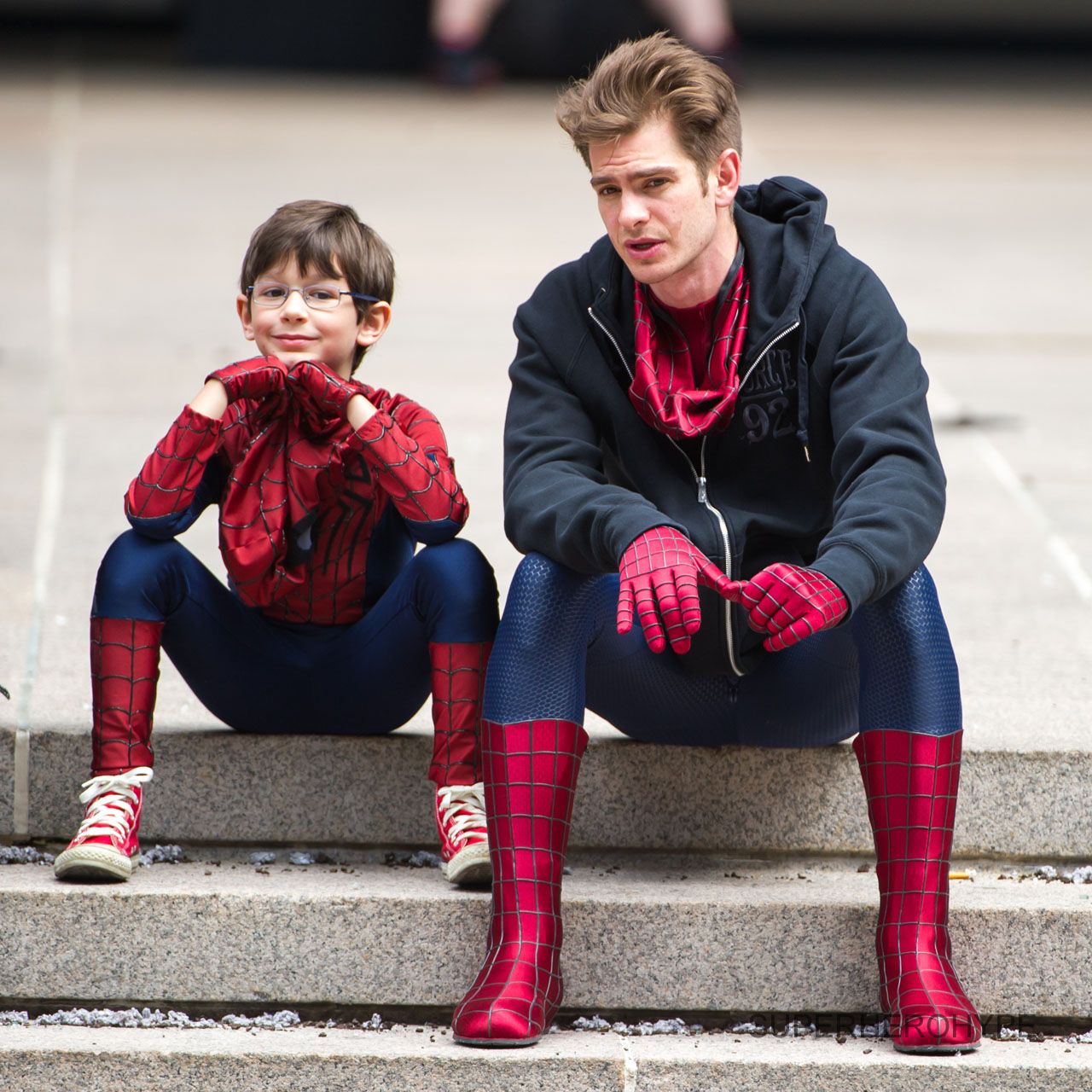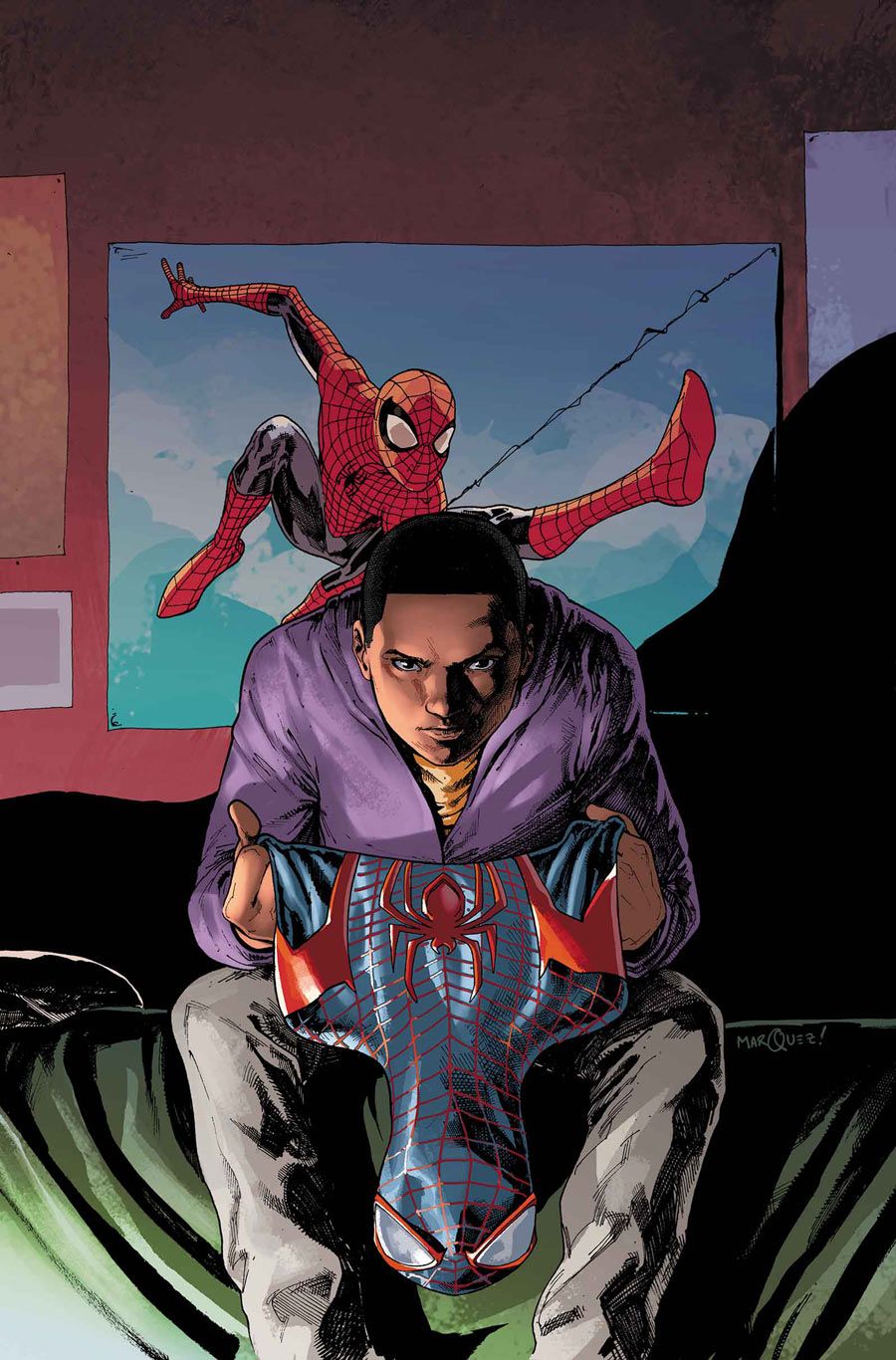SPOILER WARNING: The following interview contains some mild spoilers for "The Amazing Spider-Man 2.
In "The Amazing Spider-Man 2," the stakes are higher than ever. The scope expands to include numerous villains and characters from the "Spider-Man" universe. Peter Parker's own role in the creation of chaotic nightmares becomes more and more apparent.
And yet, there's something smaller about director Marc Webb's superhero sequel. There's a tighter focus on Peter's relationship with Gwen Stacy, as they struggle over their future together, and their presently divergent paths. Even when he's wearing the mask, there's something slower about Peter. He doesn't spend all of his time chasing robbers and punching electrically enhanced demigods in the face. He takes time out of his busy superhero schedule to give an introverted outcast a pep talk; he helps out bullied kids who come from a place just left of center. Even when he's battling for the safety of Manhattan, Spider-Man is always trying to save the underdog.
"Sinister Six" Producers Tease "Redemption" For Spider-Villains
Indeed, Peter's instinctual need to look out for the little guyis one of Andrew Garfield's favorite parts about playing the character. Garfield, on the cusp of releasing his second film as the friendly neighborhood wall-crawler, spoke with Comic Book Resources about the web-slinger's small-scale superheroism, the film's presentation of role models for young men and women, how much longer he envisions playing Peter Parker, and why he thinks the "Spider-Man" movies need Miles Morales.
CBR News: "The Amazing Spider-Man 2" is a much bigger film than your first film as Spider-Man. Last time, Peter only had to worry about the Lizard. This time, he's facing Electro, the Green Goblin, even Rhino once or twice. But for me, the best parts of the movie are when it looks away from that action and allows Spider-Man to stop and help a kid out of a bully situation, to walk that kid home and compliment him on his science project. Or even when he first bumps into Max Dillon on the street, in the middle of a car chase, and stops to pick up Max's belongings and give him a bit of an ego boost. Last year, "Man of Steel" came under fire for not having Superman do this kind of thing -- for not having him help the cats stuck in the trees, so to speak.
Andrew Garfield: It's so funny that you mention that, and I'm excited you felt that way. The boy, the bullied boy, was not a character in the original script. He was actually a thought that I had about wanting to see me as a seven-year-old in the movie. I mentioned it to Marc and the writers. I suggested that we see the exact thing that I needed when I was a seven-year-old, to have it happen to a seven-year-old: Spider-Man showing up to give him the strength to find his own inner-strength, even though he's this incredibly skinny seven-year-old. I'm really proud of that.
That's what Spider-Man is all about. That's one of the big things that Spider-Man has always been about, to me. He is the underdog. He is all about the small moments. He is the working class hero. He's not an alien. He's absolutely of this Earth. Whenever he can, he's going to try and help out the little guy.
I had this one idea that Spider-Man, in the middle of a car chase, decides he'll pull out of the car chase for a minute if there's an old lady who needs help crossing the street. And actually, there was a scene that I had written with the writers, and a movement director -- a physical comedy director -- where I was saving a cat from a tree. Unfortunately, we didn't get to shoot it. But I love that. That's what Spider-Man is about, to me. He's about the small stuff, as much as he's about the big stuff. Especially that Jorge character, the bullied character; he was hugely important to me.
Even in the midst of "the big stuff," you see that side of Spider-Man. For instance, the Times Square scene: Spider-Man's first battle with Electro. He tries to peacefully negotiate the situation, before resorting to nuclear options. Peter really wants to help Max out. He might not remember his name, but he remembers the encounter, he remembersbumping into Max on the street --
The point of that scene, for me, was there is this mass-minded, fear-based consciousness that was about to kill someone and something innocent. I think the amazing thing about what makes Spider-Man Spider-Man is actually Peter Parker. Peter Parker is an orphan and an underdog. When he first sees Max, he can see himself. He sees his own feelings of not being good enough, of self-doubt, of lacking in self-love. These are things that he's gone and goes through. When he sees Max in Times Square, he can see that this is a guy who just needs a little bit of love and a little bit of attention. I loved making that connection with him, early in the film. I thought it was super-important. Because, whenever Peter can use his compassion and his humanity to cut through a situation, he'll do it. He'd much rather not fight than fight. I think the last resort is punches and kicks and webs.
I like the idea of the "trickster" archetype. What we love about the trickster is, he tends to use his enemies' weaknesses against themselves. He's kind of a Chaplin-esque, Bugs Bunny, Buster Keaton kind of guy who lets the bad guy tie himself up. I also love that the humanity of Peter Parker is apparent. Of course, it's Peter in the suit, and he'll do everything he can not to fight, to be a pacifist. That's a beautiful thing to play, and I think it's an important thing for young kids to see, you know?
But it's also important for young kids to see that if need be, you have the ability to stand up for yourself and to stand up for people who need standing up for -- but only as a last resort, if there are no more negotiations to be had.
"Venom" Producers Tease Big Screen Face-Off with Carnage
Even if he prefers pacifism, Peter likes having fun. He clearly enjoys being Spider-Man. He has the theme song as his ring tone. I don't know if you looked at it this way, but I interpreted it as, he actually wrote himself a theme song!
Yeah, exactly! [Laughs] I think that's right. And in terms of being a role model, there's nothing better to show young kids than someone who enjoys their life, someone who enjoys their gifts and doesn't shy away from who they are. Peter Parker gets to do it in a mask, so he feels much more free to really own the symbol he's created, to really enjoy being Spider-Man, to really enjoy the hell out of it.
I think what I'm realizing as well, simultaneously, as I play this part, is that it's finite. I won't always be Spider-Man and play Spider-Man. I'm thirty years old; it's getting a bit ridiculous. [Laughs] I know for myself, right now, that all I can do is enjoy every ounce and every moment. I think that's exactly what Peter is doing as Spider-Man as well. "I've been given this opportunity." That's what we all wish to do in our own lives. We all wish to enjoy who we are and the gifts we've been given, and give them generously. And not only give them generously, but, as you say, really enjoy it and have fun and not take it all so seriously -- because it's a great ride.
There's also Gwen Stacy, who is a very strong role model for young women. She very consciously puts herself in the line of fire in this movie. She constantly says, "I'm with you, I'm in this, and it's my choice." She's obviously brilliant. She's key in helping Spider-Man figure out how to take on Electro. You can argue that she's the co-superhero of this movie.
Absolutely, yeah. And her gifts are obvious. Her gifts are with science, with her own compassion, her own humanity. She wants to change the world and save the world in her own way, through her science pursuits, by going to Oxford, by becoming a medical student maybe, getting a research grant. It's a beautiful character. Of course, it goes without saying, that she's absolutely her own person. So many times, in these types of movies, you see the damsel in distress. Gwen Stacy is not that in any way, shape or form. That was really important to Emma and really important to the filmmakers, to make sure that she was on her own path, as much as Peter is on his. It's a really, really beautiful character.
You mentioned before that there's a ticking clock on your time as Spider-Man. That said, this movie takes place early in Peter's career. There's a whole lot of life left for the character to live. In the comics, Gwen is an early part of his life, and he winds up married to Mary Jane for a time. Can you see yourself playing this character for that long, to see some of those big life events? Can you see yourself wanting to take Spider-Man that far?
I don't know. All I know is that these movies are big, and they take a really long time to make. They take a lot of time and energy and passion and love -- which I give as freely as I possibly can, and as wholly as I possibly can. I know that all I want to make sure of is that this is a complete set. I don't want it to be things like -- I want it to feel like a circle. I want the two ends to join, somehow. I don't know what that means, yet. I don't know what that means in terms of the quantity of Spider-Man movies I do. But I know that I don't particularly want to be a 40-year-old Spider-Man. [Laughs] I do know that time is fleeting.
You're very outspoken and on-the-record about your fondness for Spider-Man and what he means to people. You've openly wondered about Spider-Man's sexuality, you've talked about if Spider-Man is Jewish. You've made it clear that you believe Spider-Man is for everyone. Right now, Sony is clearly interested in expanding this universe, having announced "Venom" and "Sinister Six." What do you think about the idea of "Ultimate Spider-Man" as a film, a movie about Miles Morales? Is there a way for that character to coexist with what you guys are doing in the "Spider-Man" films? Is that something you've given thought to?
I have given that thought. I think one of the amazing things about Spider-Man is that you don't see skin color when he's in the suit. You don't see any religious beliefs. You don't see any denominations. Everyone can project themselves into that suit. It's incredibly powerful in that way. So of course I think it's important that the openness, the casting, in terms of who could be Spider-Man, could be absolutely anyone. A hero is a hero, whether you're a man, woman, gay, lesbian, straight, black, white or red all over -- it doesn't matter.
Miles Morales was a huge moment in this character's comic book life. And I do believe that we can do that. It's something I'm really interested in figuring out; an eloquent way of coexisting, or passing on the torch. I don't have an answer, but I think it's actually a really important move. I think it's a really beautiful and important move.
All I'm saying is, you need to tell Sony to make a movie with you and Miles Morales. That's all.
[Laughs] I'll put in the request, for sure.
"The Amazing Spider-Man 2" opens in theaters on May 2.




